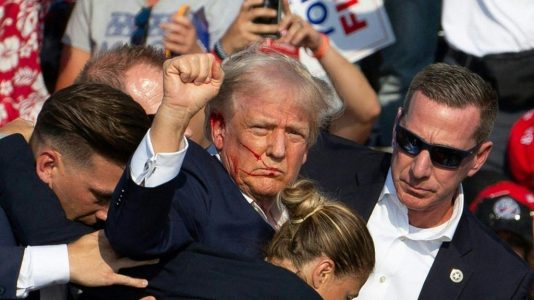Donald Trump’s security detail and a sniper team were not aware there was a gunman on a roof until he opened fire on the former president, the acting Secret Service director said Tuesday.
Local law enforcement identified the gunman, Thomas Matthew Crooks, as a “suspicious person” about 90 minutes before the July 13 attack at a Trump campaign rally in Butler, Pennsylvania, according to FBI officials.
Since the assassination attempt, questions have been raised about when the Secret Service became aware of the presence of the gunman on the roof of a building that overlooked the campaign event.
“Based on what I know right now, neither the Secret Service counter-sniper teams nor members of the former president’s security detail had any knowledge that there was a man on the AGR roof with a firearm,” acting Secret Service chief Ronald Rowe told a joint Senate committee.
“The only thing we had was that locals were working an issue at the three o’clock, which would have been the former president’s right-hand side, which is where the shots came from,” Rowe said.
“Nothing about man on the roof, nothing about man with a gun,” he said.
FBI special agent Kevin Rojek said Monday that a police officer was boosted on to the roof by another officer at 6:11 pm.
Crooks pointed his rifle at the officer, who “immediately dropped to the ground.”
“Approximately 25 to 30 seconds after this encounter, the subject fired eight rounds before being successfully neutralized,” Rojek said.
Rowe said Crooks was shot dead by a Secret Service sniper “within 15.5 seconds” of firing the first shot.
The Republican presidential candidate was wounded in the right ear, while two rally attendees were injured and a Pennsylvania firefighter was killed.
– ‘Ashamed’ –
Rowe said he “cannot defend” why the rooftop where Crooks fired from was not better secured, and said he was “ashamed” about the security lapses.
He said local law enforcement had been tasked with securing the rooftop. “We assumed that the state and locals had it,” he said.
Asked why Trump was allowed to take the stage, Rowe said Crooks had not been identified as a threat but only as suspicious.
“We did not have anything beyond suspicious person that was communicated to us,” he said. “Suspicion had not risen to the level of threat or imminent harm.”
Rowe said communications failures between local law enforcement and the Secret Service contributed to what he called a “failure on multiple levels.”
The Secret Service had “technical difficulties” with its counter-drone capabilities on the day of the attack and they were not “operational until after five o’clock,” he said.
Crooks flew a drone near the rally site for 11 minutes about two hours before the attack, according to the FBI.
FBI deputy director Paul Abbate also addressed the committee hearing and said the authorities still have not established a motive.
He said they have identified a social media account believed to be associated with Crooks.
“In about the 2019, 2020 timeframe there were over 700 comments posted from this account,” Abbate said. “Some of these comments, if ultimately attributable to the shooter, appear to reflect anti-Semitic and anti-immigration themes, to espouse political violence and are described as extreme in nature.”
Secret Service Director Kimberly Cheatle resigned last week after acknowledging that the agency had failed in its mission to prevent the assassination attempt.
AFP.
READ ALSO:
- Nigerian Forward Ekong Joins Swedish Club Malmo FF
- Rivers LG Chairman appoints over 100 Special Assistants for second time in 6 months
- ICC U19 Cricket World Cup: NSC approves Foreign Training in Malaysia
- Speed Darlington Petitions DIG To Comply With Court Order Over His Detention
- Examination Malpractice: Expert Urges Govt To Deploy CCTV


